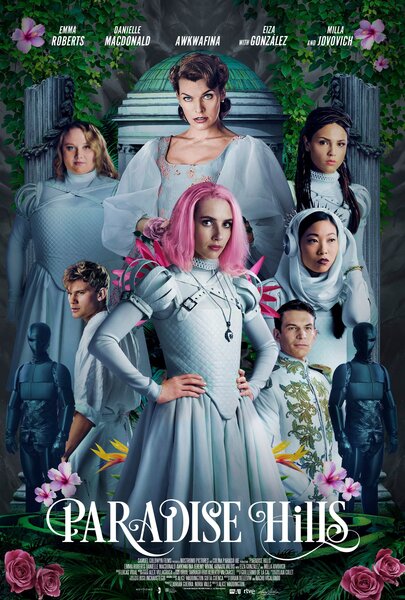Create a free profile to get unlimited access to exclusive videos, sweepstakes, and more!
Paradise Hills star Eiza González on how her child star past shaped her performance

In Paradise Hills, the new film by Spanish director Alice Waddington, Uma (Emma Roberts) wakes up on a lush dream-like island with no memory of how she got there. It turns out that this strange spa-slash-finishing-school is the go-to location for privileged girls to be taught how to be "proper ladies" by the glamorous but quietly insidious Duchess (Milla Jovovich). Also participating in this program is Amarna, a beloved pop star who wants control over her own life against the desires of her management.
For Eiza González, who you may recognize from Alita: Battle Angel, Baby Driver, or the TV adaptation of From Dusk Till Dawn, this role carried a special significance, as she discussed in an interview with SYFY WIRE FANGRRLS.
"It was a little bit of a love letter to my younger self," she explained. "I was born and raised in the industry ... Well, not born and raised, but I started working really young, I was 13, and I was a pop singer, so I went through the process of discovering who I was [while in the business]."
Amarna's journey exemplifies the core themes of Paradise Hills: how the smothering expectations put upon young women by a patriarchal society, as well as the entertainment industry, force us into an unwinnable game that saps us of our true selves. For Amarna, not even the power of celebrity can stop her from being controlled by greater forces. It's something González understood only too well.
"I got my period while I was working! It was so weird, you know, I became a woman while working! I think that really is a good way to sum up the pressure that I had growing up in this industry and all the anxiety I lived with throughout that time. I love how Amarna carries herself with such victory. That was something I never had that I wanted to bring to this character that I saw in other musicians growing up."
The first thing viewers notice about Paradise Hills will undoubtedly be its stunning aesthetics. Imagine a bondage-style Disney princess world where femininity is literally fetishized and you're halfway there. This is a world that simultaneously caters to the female gaze while reinforcing a stranglehold of misogynistic power over the women who inhabit it. For Waddington, a photographer and costume designer, this work is very much in her wheelhouse, but for the cast it was a fascinating and wholly new experience. As González notes, it was also there on the script level.
"[The script was] accompanied with visuals. Alice is a visual director in the sense that she put everything on the page so we could kind of build the world with her. That was very different because I've never had the chance to do that before. It's always exciting to know what you're getting yourself into! Really, that just goes to show how incredibly the talented set designers, costumes, make-up, hair ... everyone, it was just such a group effort."
Speaking of those costumes, fashion plays an integral part in Paradise Hills. The students, who also include Danielle Macdonald and Awkwafina, wear virginal white frocks held tightly in place with corsetry and thick leather buckles. Their nightwear is somewhere between vintage lingerie and the costuming of a Victorian doll. In the opening scene, Uma's wedding dress is overwhelmingly large and capped off with a bedazzled face mask akin to a dog's muzzle. Here the style is the substance, and it was a massive part of helping González and company get into character.
"I think the costumes really helped with it, because they were very restrictive. We could barely breathe. I've never done a period film before, so I didn't know was it was like to go through the process of getting dressed up every morning, and that was something that really kind of played into the conversation. We would actually go through the same process as the girls would go through in the school: We would get dressed, we'd go through hair and makeup, and it was just hours of it! It made us walk a certain way, think a certain way, you could definitely see the different physicality with all of us."
Everything about Paradise Hills is unabashedly female-driven. The story is centered on the unique plight of living under patriarchy, the style is unconcerned with appealing to male desire (even in a story about how such things dominate women's lives), and women are in almost every frame of this movie. It's a disheartening rarity, even today, to see a genre film like this that's directed by a woman, starring a majority female cast, and focused on the narratives of young women. It was a key reason González wanted to make the movie.
"I've been lucky enough to work, and I actively made a big choice early on in my career to work with female directors. It really makes a huge difference, especially when you're taking on subjects like this, something that really only women can relate to: the amount of pressure we get over our bodies and looks; who we're gonna marry; who we're gonna be. There was an insight that Alice had that made it different. She also wrote this script and was part of the creative journey. […] One of the biggest reasons why I wanted to be part of this film is because it was us working with a group of very intuitive women, from the cast to the people behind it, women who follow their gut when it comes to their art. That was something that was very special to me just because I've felt like I learned so much through the process and grew as an artist working with these women."
Paradise Hills is a film that has a lot to say, and what it has to say are things that a lot of young women may be eager to hear. The freedom to be yourself in a world that demands the opposite can be a long-fought fight against the odds, but it's worth it.
"The twists and turns that I don't wanna spoil what happens in the movie were very timely, because you're just defining who you are but you also have a society telling you who you have to be and what role models you have to be, especially back in the day," said González. "Now, I think it's beautiful how we've turned into such a different world for teen girls, with, you know, transgender women being so open and part of the conversation and homosexuality being something that is so normalized now. There are so many more conversations now than when I started in the early 2000s, so it was a different world, and that was sort of what attracted me to this character, what I could bring to her that I didn't have when I was a younger woman."
Paradise Hills is available on digital and on-demand now.















